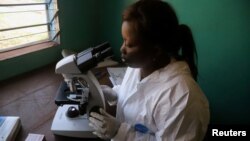The World Health Organization says the rapid, aggressive and coordinated health response to the Democratic Republic of Congo's latest Ebola outbreak is largely responsible for quickly containing the deadly virus. WHO and Congo's Ministry of Health have officially declared the end of the ninth outbreak of Ebola in the DRC in the capital Kinshasa.
Ebola killed more than 11,300 people in Guinea, Liberia and Sierra Leone by the time this devastating epidemic, which began in 2014, was brought to an end two years later. In contrast, the Ebola outbreak in the DRC infected 38 people, caused 29 deaths, and was stopped in fewer than four months.
Michael Ryan, WHO's assistant director-general of emergency preparedness and response, was part of the large team of health specialists working on the strategic response plan in DRC. He said the Ebola outbreak in West Africa quickly spiraled out of control because of delays in detecting the event and getting a full-scale operation under way to combat the virus.
"In this case in Congo," he told VOA, "what we had was very, very, very effective early containment measures and then an effective scale-up of both national and international partners working together. So, that is the difference for me. I know it sounds extremely simplistic. But, in many of these situations, it is the simple things that make the difference. Speed and coherence."
Ryan said it is too early to suggest the vaccine used in the operation has played a significant role in stopping the epidemic. He believes the rapid identification of cases and contacts, as well as contact tracing and follow-up, were probably the major factors in containing the disease.
He noted, however, the presence of the vaccine has provided the affected communities with an element of hope that they could survive this fatal disease.
"The aim of vaccination is to protect those people who potentially are being exposed," he said, "But, the fact that you are bringing something that can help protect people … it just introduces that element of hope, rather than hopelessness."
Ryan warned the Ebola virus could re-emerge, so extensive follow-up measures are necessary. He said intensive surveillance is continuing and that much hard work lies ahead to strengthen the health system, so it can rapidly detect and respond to future outbreaks.




